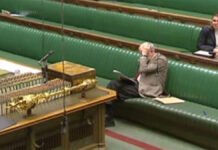And if all others accepted the lie which the Party imposed — if all records told the same tale — then the lie passed into history and became truth. George Orwell 1984
A deeply controversial internal report was leaked in April 2020 to journalists and then distributed on social media. The shocking content showed Labour’s factional war along with the toxic relationships between different groups within the Party and how vile they had become.
The dossier – dated March 2020 and leaked in April 2020 – claimed some Labour Party staffers did not want Jeremy Corbyn to win the 2017 general election and actively worked to destabilise his leadership. The Whatsapp messages suggested they used their positions in the Labour Party to undermine the 2017 general election.
John Mcdonnell wrote of the report in 2020
The document chronicles many failures in the complaints process and includes evidence from thousands of emails, messages and two WhatsApp groups featuring senior management. These internal messages have sparked further controversy, as they appear to show that senior party staff were viciously cruel to members of our shadow cabinet, and were even actively working to undermine the party’s electoral success.
The report will have been especially affecting for those who worked so hard and enthusiastically, delivering leaflets, knocking on doors and hitting those phone lines, to try to secure the election of a Labour government in 2017. If its contents are accurate – and so far, I understand that there has been no public denial of the veracity of the internal communications exposed – the hearts of many party members and supporters will be broken.
It has been calculated that Labour came within 2,500 votes, spread across a limited number of constituencies, of forming a government in 2017. If what is reported in the leaked document is true, that a group of senior staff undermined the chances of Labour going into government, it would represent the most shocking act of treachery against the party, its members and our supporters in Labour’s century-long history.
It would also represent a betrayal of all those who desperately needed a Labour government, especially in light of the current crisis.
We could now have been in the third year of a Labour government fully funding an NHS, which would consequently be so much better resourced and prepared for the coronavirus pandemic. The nurses and health workers and carers we go out to clap every Thursday evening would have had a decent pay rise, which the Conservatives voted to deny them. We would have celebrated the third anniversary of Labour’s formation of a National Care Service, fully funded to provide quality care for our elderly and vulnerable fellow citizens, with carers professionally recognised and properly paid.
So if the report has weight, expect all of us whose dreams of this transformative Labour government were shattered in 2017 to be angry.
They stopped a manifesto of hope from becoming a reality.
A disturbing read of plain old nasty betrayal and treachery.
The 860-page document unearthed a plethora of party horrors: allegations of misuse of funds, the continued undermining of the 2017 electoral campaign and the then-leader Jeremy Corbyn’s attempts to investigate anti-Semitism in the party, as well as vicious criticism of leading Labour figures by staff members in private messages.
The report was the result of an internal investigation into the work of Labour’s governance and legal unit in relation to antisemitism. Created by party staff, it pulls together an estimated 10,000 emails, thousands of messages exchanged on work accounts, and the contents of two WhatsApp group chats apparently created by senior management in Labour headquarters.
The document was leaked in full and this prompted two investigations by Labour – one by an independent external investigator and another by Martin Forde QC.
Starmer set up an inquiry to examine both the contents of the report and how it was authored and leaked. This was known as the Forde Inquiry.
The Forde Inquiry was originally set to conclude in mid-July, but this timescale was described by Forde as “impractical”. It then aimed to deliver the report “by the end of 2020”, which was later changed to “early in 2021”.
After the two delayed release dates, the Forde report has been delayed indefinitely. The chair announced in February this year that the probe had “recently been made aware” that the Information Commissioner’s Office is investigating the same leaks.
You really couldn’t make it up! indefinitely delaying publication of the findings of this highly charged inquiry into a leaked report on antisemitism and internal party culture under Jeremy Corbyn, stating concerns it could prejudice an investigation by the information commissioner.
The weak excuse that Labour set up an internal investigation at the time to look into potential security breaches and made a disclosure to the ICO. Then for The Forde Inquiry to say it has only now learnt that the ICO is investigating the potential breaches, as a result, is a little insulting to members and the wider public who all read those initial media publications saying that Starmer was looking into how the documents were leaked.
It’s also worth noting the ICO investigate breaches in data protection and will not be looking into the context of the leaked documents but just how they were leaked.
The Labour party officials opposed to Jeremy Corbyn worked to lose the 2017 general election in the hope that a bad result would trigger a leadership contest to oust him, a dossier drawn up by the party suggests.
Now instead of the Forde report and the context of the #LabourLeaks being publicly scrutinised, we are now seeing the Labour party accusing five former party staffers – Seumas Milne, Karie Murphy, Georgie Robertson, Harry Hayball and Laura Murray – of leaking the controversial internal report.
In response to the move by the Labour Party, the five individuals are “considering bringing legal claims against the party over its victimisation of them and for breach of their confidentiality”, according to well-placed sources.
Sources say the party is planning to name the five ex-staffers, who strenuously deny the claim that they leaked the Labour report last year, as part of its defence to legal action brought by individuals suing the party over the leak.
The truth is if these five people did leak the report they should be held up as heroes, whistleblowers of corrupt practices conducted within the Labour party by staffers acting against the best interest of both their leader and the party that employed them.
The five have said they “entirely reject these baseless claims” and their lawyers have described the party’s actions as an attempt to “deflect on to them its own liability in claims brought by a group of claimants who are suing the party over the leak”.
Emilie Oldknow, a former Labour executive director, is one of the individuals named in the report who has taken legal action against the party over its leaking. Her barrister earlier this year described the report as a “one-sided factional attack” on ex-staffers.
Earlier this year, Labour said it did not want to reveal information about the leakers without being ordered to do so by the court. Oldknow applied for a ‘Norwich Pharmacal order’ to force disclosure but this was unsuccessful.
The application was dismissed partly because Labour was asked to identify individuals it “reasonably believes” was responsible for the leak. Labour said it could not show beyond any doubt that a particular individual was responsible.
The judge, Justice Tipples, said at the time there was a “real risk” that if Labour were ordered to name individuals suspected of leaking the report, individuals innocent of wrongdoing could be identified.
A spokesperson for the former Labour employees today said: “They entirely reject these baseless claims. They did not leak the report, and fully cooperated with the party’s independent investigation by an external investigator, and the inquiry led by Martin Forde QC. They understand that neither of those investigations concluded that they were responsible.
“The party acknowledged in court that it cannot be certain who leaked the report and that its “case” against them is circumstantial. But it is now trying to make them foot the bill for legal action brought against it.
“The party should be focusing on the deeply troubling evidence contained with the leaked report, rather than trying to wrongly scapegoat and victimise former staff who documented it, and who have not been accused by either of the independent investigations.”
Carter-Ruck, the solicitors representing the five, said: “To the extent that the Labour Party has explained its proposed action, it is clear that it will be naming the individuals in an attempt to deflect on to them its own liability in claims brought by a group of claimants who are suing the party over the leak as well as the party bringing a related claim direct against the five.
“The party apparently admits that its case against the individuals is purely circumstantial and inferential, but has failed even to set out that case properly in correspondence, despite its obligations to do so under the relevant Court Protocol.”
The anyone but Corbyn brigade.
The report included hundreds of private WhatsApp messages and emails from Labour staff members, many of them expressing hostility towards Corbyn or his close allies and bemoaning Labour’s better-than-expected performance at the 2017 general election.
The officials discussed directing election campaign funds to favoured candidates, including the former deputy leader Tom Watson.
The Leaked report showed Labour staff used racist and derogatory names when discussing Corbyn allies and supporters it lists examples of the named staffers using insulting and aggressive language towards Labour politicians, staff and members. This includes terms like “trots” and “bitch face cow”.
The report describes them repeatedly using derogatory mental health tropes, including terms like “mentalist” and “nutter”, and repeatedly disparaged the appearance of party staff and members, using terms like “pube head”, “smelly cow” and “fat”.
The report found they also made comments saying that certain party members should “die in a fire” and that a senior aide’s “face would make a good dartboard”. According to the report, Labour MPs were also targeted as they said that those MPs who nominated Corbyn should be “taken out and shot” amongst other disparaging remarks.
Commenters made derogatory comments about Labour politicians including Ed Miliband, Sadiq Khan, Dawn Butler, Diane Abbott, Rachael Maskell, Clive Lewis, and Corbyn. Abbott was allegedly described as “truly repulsive” and “a very angry woman”, while fellow black Labour MP Butler’s claims to have experienced racism within the parliamentary party were said to have been dismissed.
There was also one instance of a staffer in the policy unit sharing an “anti-Islam” clip from right-wing commentator Douglas Murray in the aftermath of the 2017 Westminster attack.
The report also documents talk of violence against Corbyn; talking about “hanging and burning” him, calling him a “lying little toerag”, claiming “death is too kind for LOTO (Leader of the Opposition)”. Senior management were found to be telling staff that they need not be “comradely” in their attitudes and statements about the leader.
The report alleges that the management team coordinated in “refusing to share basic information to LOTO during the election”, created a “parallel general election campaign” and boasted about “hardly working” during the campaign. There are marked statements about their dismay at Labour over-performing expectations during the campaign, and apparent disappointment with the increase in seats after the election.
An election night chat log shows that 45 minutes after the exit poll revealed that Labour had overturned the Conservative majority, one senior official said the result was the “opposite to what I had been working towards for the last couple of years”, describing themselves and their allies as “silent and grey-faced” and in need of counselling.
Another said: “We have to be upbeat and not show it,” while a third told the group that “everyone needs to smile”, describing the result as “awful”. Another very senior party official said it was going to be “a long night”.
The senior officials keenly watched polls during the election campaign and hoped that the party that employed them would fare badly. When one YouGov poll showed the party up during the campaign, one said: “I actually felt quite sick when I saw that YouGov poll last night.”
Another official argued that the polling bounce for the party was actually “great”, stating: “I shall tell you why, it is a peak, and the polling was done after the Manchester [terror] attack, so with a bit of luck this speech will show a clear polling decline and we shall all be able to point to how disgusting they truly are.”
The report also details large volumes of abusive discussion by senior officials about colleagues and activists from the party’s left wing.
Many MPs, party members and activists within the Labour Party expressed dismay at the contents of the report and called to launch an investigation into the behaviour detailed in the report, including “the possible misuse of funds” by officials.
The examples from chat archives published in the document include:
- Conversations in 2017 which appear to show senior staff preparing for Tom Watson to become interim leader in anticipation of Jeremy Corbyn losing the election
- Conversations which it is claimed show senior staff hid information from the leader’s office about digital spending and contact details for MPs and candidates during the election
- Conversations on election night in which the members of the group talk about the need to hide their disappointment that Mr. Corbyn had done better than expected and would be unlikely to resign
- A discussion about whether the grassroots activist network Momentum could be ‘proscribed’ for being a ‘party within a party’
- A discussion about ‘unsuspending’ a former Labour MP who was critical of Jeremy Corbyn so they could stand as a candidate in the 2017 election
- A discussion about how to prevent corbyn-ally Rebecca Long-Bailey gaining a seat on the party’s governing body in 2017
- Regular references to corbyn-supporting party staff as “trots”
- Conversations between senior staff in Lord McNicol’s office in which they refer to former director of communications Seamus Milnes as “dracula”, and saying he was “spiteful and evil and we should make sure he is never allowed in our Party if it’s last thing we do”
- Conversations in which the same group refers to Mr. Corbyn’s former chief of staff Karie Murphy as “medusa”, a “crazy woman” and a “bitch face cow” that would “make a good dartboard”
- A discussion in which one of the group members expresses their “hope” that a young pro-Corbyn Labour activist, who they acknowledge had mental health problems, “dies in a fire”
The investigation also accuses the former General Secretary Lord McNicol, and other senior figures of providing “false and misleading information” to Jeremy Corbyn’s office in relation to the handling of antisemitism complaints, which the report claims meant “the scale of the problem was not appreciated” by the leadership.
The report claims McNicol and staff in the Governance and Legal Unit “provided timetables for the resolution of cases that were never met; falsely claimed to have processed all antisemitism complaints; falsely claimed that most complaints received were not about Labour members and provided highly inaccurate statistics of antisemitism complaints”.
Responding to the messages cited and the allegations made against him in the report, Lord McNicol said:” The energy and effort that must have been invested in trawling 10,000 emails rather than challenging antisemitism in the party is deeply troubling.
The irony of Lord McNicol statement is that hundreds of thousands of social media posts and comments made by Labour members were trawled to produce evidence real and fake in the attempt to comply with antisemitism allegations. That must have taken a real mammoth effort by the Labour governance team.
Unfortunately, the Forde report does not look set to see the light of day any time soon, however, the Off-Guardian has hosted the original Labour leaks since its realise and can be found here. LINK
Help Us Sustain Ad-Free Journalism
Sorry, I Need To Put Out the Begging Bowl
Independent Journalism Needs You
Our unwavering dedication is to provide you with unbiased news, diverse perspectives, and insightful opinions. We're on a mission to ensure that those in positions of power are held accountable for their actions, but we can't do it alone. Labour Heartlands is primarily funded by me, Paul Knaggs, and by the generous contributions of readers like you. Your donations keep us going and help us uphold the principles of independent journalism. Join us in our quest for truth, transparency, and accountability – donate today and be a part of our mission!
Like everyone else, we're facing challenges, and we need your help to stay online and continue providing crucial journalism. Every contribution, no matter how small, goes a long way in helping us thrive. By becoming one of our donors, you become a vital part of our mission to uncover the truth and uphold the values of democracy.
While we maintain our independence from political affiliations, we stand united against corruption, injustice, and the erosion of free speech, truth, and democracy. We believe in the power of accurate information in a democracy, and we consider facts non-negotiable.
Your support, no matter the amount, can make a significant impact. Together, we can make a difference and continue our journey toward a more informed and just society.
Thank you for supporting Labour Heartlands












